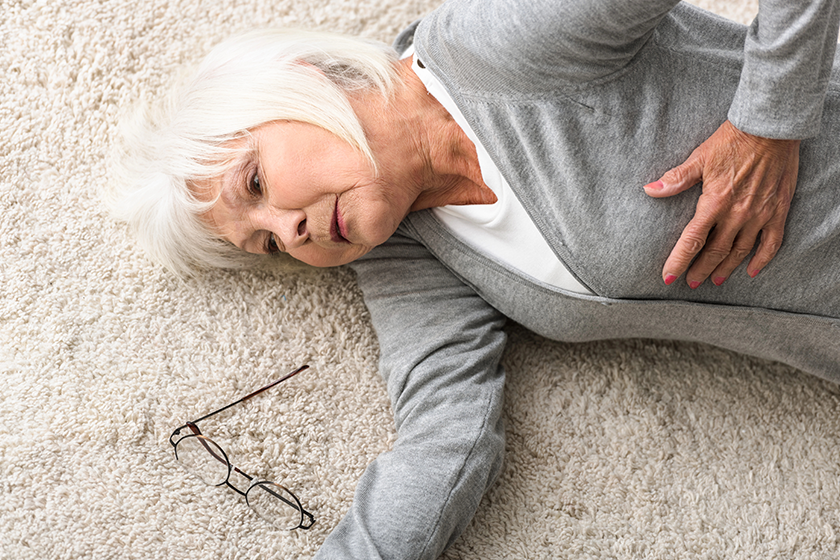Addressing the challenges of caring for loved ones with dementia includes understanding the serious concern of dementia falls. By recognizing the underlying causes, you can make informed choices to reduce risks and improve the quality of life for those affected by dementia, especially when considering assisted living options.
The Connection Between Dementia and Falls
Dementia affects cognitive functions such as memory, judgment, and attention, contributing to an increased risk of falls. Individuals with dementia often experience confusion, disorientation, and a lack of awareness of their surroundings, which may lead to unsteady walking and accidents. These cognitive challenges make it difficult for them to recognize hazards, increasing their likelihood of falling.
Falls are common among individuals with dementia due to the physical changes that accompany the condition. Muscle weakness, reduced coordination, and impaired vision are typical symptoms that compromise balance and stability. As a result, individuals with dementia may find it challenging to navigate their environment safely, especially in unfamiliar settings.
Medical Conditions Contributing to Dementia Falls
Several medical conditions often coexist with dementia and can contribute to the risk of falls. Cardiovascular issues, such as low blood pressure and irregular heartbeats, can cause dizziness or fainting spells. Additionally, medications prescribed for these conditions may cause side effects, like drowsiness or vertigo, further increasing the risk of falls.
Other conditions, such as arthritis and Parkinson’s disease, can exacerbate mobility issues, making it difficult for individuals with dementia to move around safely. Incontinence, a common problem in dementia residents, may lead to hurried movements and slips, especially if floors are wet or slippery. Recognizing these contributing factors is crucial in assessing the overall risk of falls in dementia residents.
Environmental Factors Influencing Falls
The physical environment plays a crucial role in the likelihood of falls among dementia residents. Cluttered spaces, poor lighting, and uneven floors present significant hazards. Individuals with dementia may struggle to navigate these obstacles, leading to trips and falls.
Environmental modifications can greatly reduce these risks. Ensuring adequate lighting in all areas, installing handrails and grab bars, and maintaining a clutter-free living space can enhance safety. It’s important to evaluate the home environment of your loved one and make necessary changes to accommodate their needs.
The Emotional Impact of Dementia Falls
Falls can have a profound emotional impact on individuals with dementia and their caregivers. Fear of falling again can lead to reduced mobility, as individuals may become reluctant to move around. This fear can also result in social isolation, as individuals may avoid activities they once enjoyed.
Caregivers may experience heightened stress and anxiety, worrying about the safety of their loved ones. Addressing these emotional challenges is essential to fostering a supportive environment where individuals feel safe and confident in their surroundings. Encouraging open communication about fears and concerns can help alleviate anxiety and promote a sense of security.
Strategies to Prevent Dementia Falls
Preventing dementia falls requires a multifaceted approach that addresses both physical and cognitive challenges. Regular exercise can improve muscle strength, balance, and coordination, reducing the risk of falls. Encouraging your loved ones to participate in gentle exercises like walking, tai chi, or swimming can significantly enhance their physical health.
Cognitive training programs can also benefit individuals with dementia by improving attention, memory, and problem-solving skills. These programs can be tailored to meet individual needs and can be a valuable tool in minimizing fall risks.
Diet and nutrition play a vital role in fall prevention. Ensuring a balanced diet rich in calcium and vitamin D supports bone health, reducing the severity of injuries from falls. Hydration is equally important, as dehydration can lead to dizziness and confusion.
The Role of Caregivers in Fall Prevention
Caregivers play a critical role in preventing dementia falls. They must monitor their loved one’s physical and cognitive changes and adjust care plans accordingly. Providing emotional support and encouragement is equally important, as it boosts the confidence and independence of individuals with dementia.
Caregivers must engage with healthcare professionals and stay informed about the latest strategies for fall prevention. Attending workshops, joining support groups, and seeking expert advice can enhance caregivers’ ability to provide effective care.
Explore Our Memory Care Community
At our Memory Care community, we prioritize the safety and well-being of individuals with dementia. Our experienced team is committed to creating a nurturing environment where your loved ones can thrive. We offer tailored care plans, engaging activities, and a secure setting to minimize fall risks.







